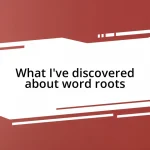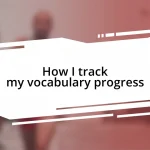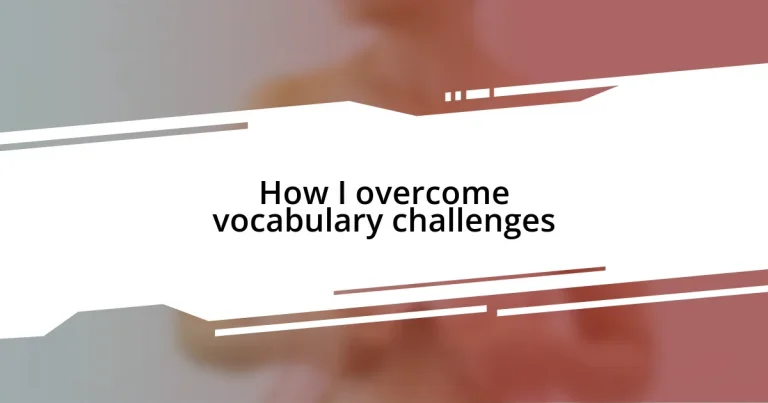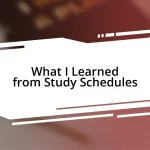Key takeaways:
- Recognizing vocabulary gaps involves reflection and context; keeping a journal of unfamiliar words can aid in addressing these challenges.
- Engaging in diverse reading practices and conversations enhances both vocabulary and confidence in using new words.
- Using flashcards with example sentences and making learning visually appealing fosters better retention of vocabulary.
- Tracking progress and celebrating small achievements boosts motivation and reinforces connection between new vocabulary and personal experiences.
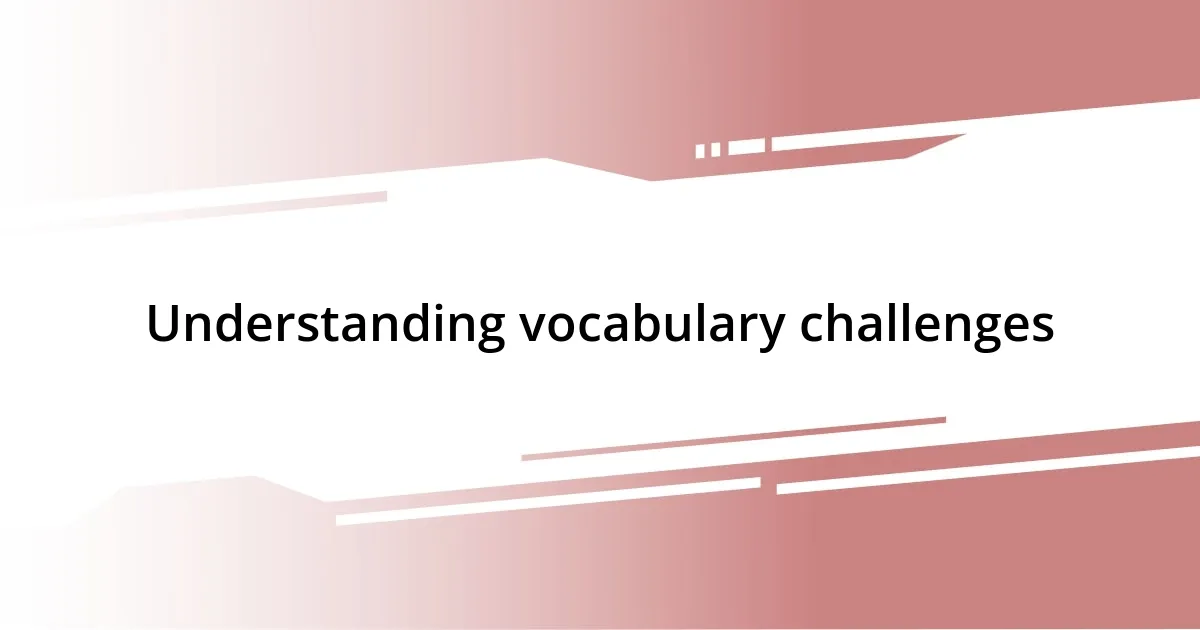
Understanding vocabulary challenges
Vocabulary challenges often arise from a lack of exposure or experience with certain words. I remember sitting in a high school English class, feeling lost during discussions about complex texts. It made me wonder, how many times have we felt overwhelmed by unfamiliar terms? That feeling of inadequacy can be quite daunting.
Understanding these challenges also means recognizing the psychological barriers we face. For instance, I often found myself second-guessing my word choices, fearing that I might use a word incorrectly. It’s a common struggle—do I sound smart or just confused? This self-doubt can stifle communication and hinder our ability to express ourselves fully.
Moreover, vocabulary gaps are not just about knowing definitions; they are about context. I’ve learned that even when I encounter a new word, its usage in different settings can greatly impact my understanding. Have you ever noticed how a single word can carry different meanings depending on where it’s used? That realization allowed me to appreciate the depth of language and inspired me to engage more deeply with new vocabulary.
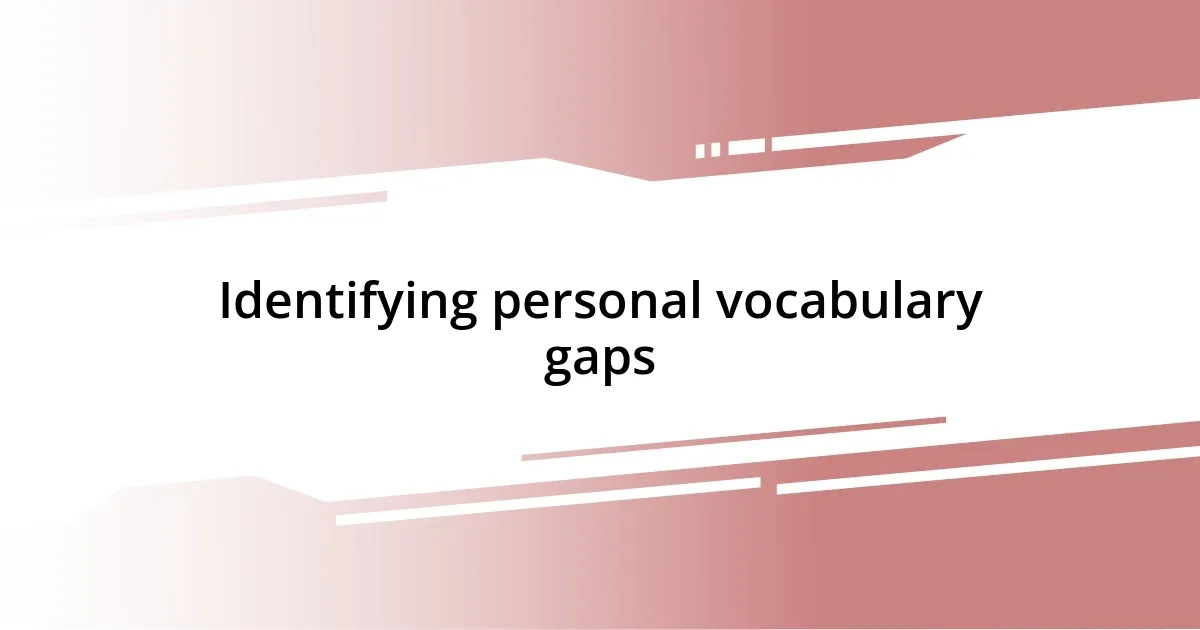
Identifying personal vocabulary gaps
Identifying personal vocabulary gaps requires a moment of reflection. I started by keeping a journal of words I stumbled upon but didn’t fully grasp. Seeing those words written down helped me confront my gaps head-on and motivated me to seek out their meanings. It’s like uncovering hidden treasures within our language skills.
There’s also something powerful about context in language. When I realized that my familiarity with a word often varied depending on where I encountered it, it sparked a desire to read widely. I began to notice how certain terms popped up in literature versus casual conversation, which changed the way I approached my learning. Instead of memorizing definitions, I engaged in discovering how and when to use different words effectively.
In this ongoing journey, I’ve found that conversations can reveal vocabulary gaps too. Once, during a discussion with a friend about a book, I hesitated for a moment, unable to articulate my thoughts precisely. That experience highlighted words I needed to expand upon, prompting me to embrace the challenge and fill those gaps. Constantly engaging with others broadens my vocabulary and enhances my confidence.
| Methods | Benefits |
|---|---|
| Journaling unfamiliar words | Identifies personal vocabulary blind spots |
| Reading diverse materials | Enhances understanding of word context |
| Engaging in conversations | Reveals vocabulary needs through real-life application |
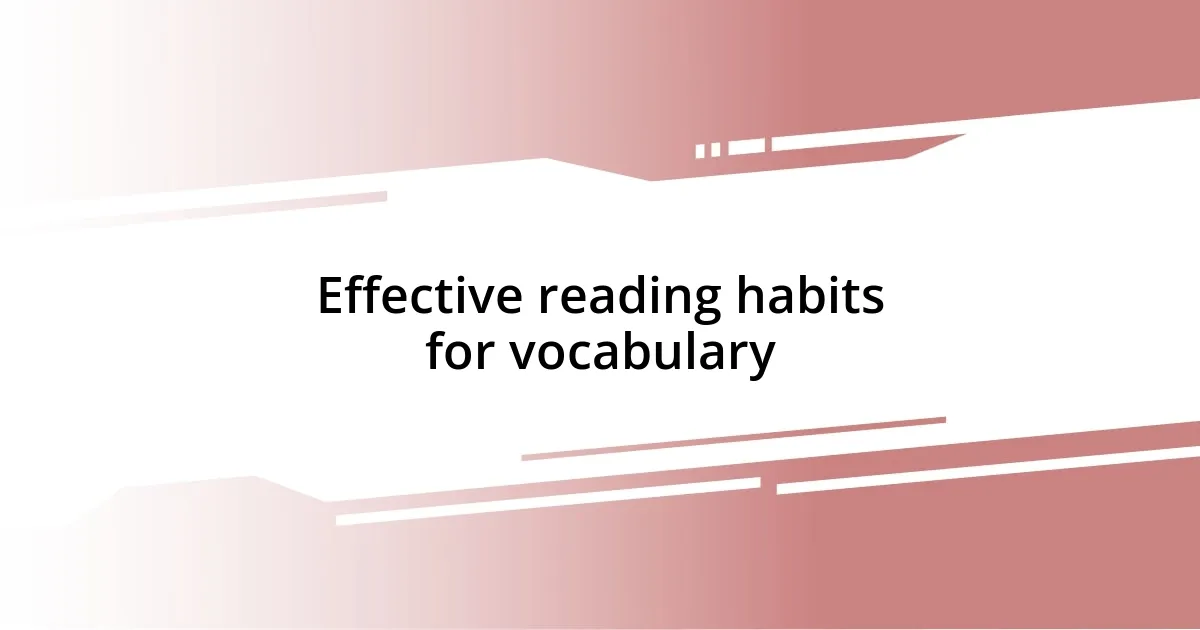
Effective reading habits for vocabulary
Reading has been a game-changer for my vocabulary development. After embracing the habit of reading daily, I noticed how immersing myself in varied genres opened my mind to new words and phrases. There’s something thrilling about encountering a beautifully crafted sentence that makes you pause and think, “Wow, I need to remember that one!” It often inspired me to jot down the new words and explore their meanings and synonyms later on.
Here are some effective reading habits that can bolster vocabulary:
- Diverse Genre Exploration: Dive into fiction, non-fiction, poetry, and articles; different styles introduce unique vocabulary.
- Active Reading: Underline or highlight unfamiliar words as you read to revisit them later, enhancing memory retention.
- Summarizing Techniques: After finishing a piece, I often summarize its main ideas and key vocabulary in my own words, reinforcing my understanding.
- Discussion Groups: Engaging with others about what I’ve read opens up avenues to clarify and discuss nuances of new vocabulary.
Each of these practices has brought me not just new words but also a renewed passion for learning. The joy of discovering and using new vocabulary has transformed my reading experience into a vibrant exploration!
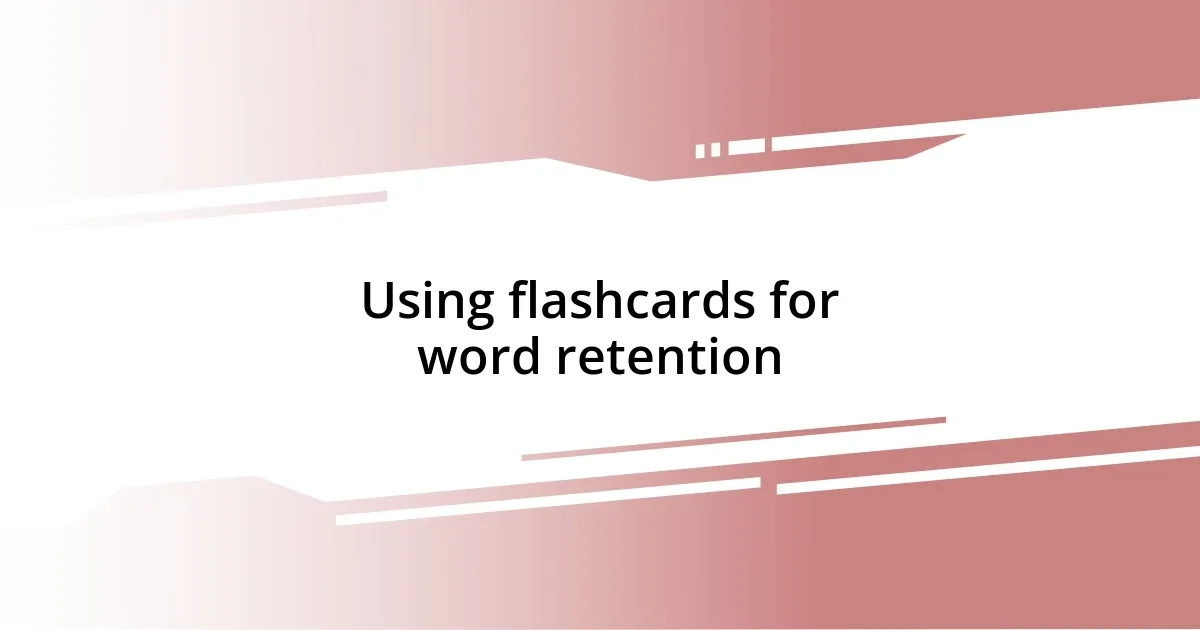
Using flashcards for word retention
One of my favorite tools for bolstering my vocabulary has definitely been flashcards. I remember starting this practice during a particularly challenging semester in school. I created flashcards for words I commonly stumbled over in essays, and each time I shuffled through them, it felt like piecing together a puzzle. Just as I’d make progress, I could physically recognize the growth of my vocabulary—each card representing a new triumph.
When I use flashcards, I don’t just write down the word and its definition; I also include an example sentence. This small addition makes an enormous difference. For instance, the word “ubiquitous” became memorable for me because I noted it in the context of technology. I wrote, “Smartphones are ubiquitous in today’s society.” That simple illustration transformed an abstract concept into something relatable and therefore easier to recall. Have you ever tried associating words with personal experiences? It can be a game-changer!
I also learned to make my flashcards visually appealing. I sketched small drawings alongside the words or used different colors for different categories. Noticing the connections between my drawings and the words made learning feel less like a chore and more like an art project, which in turn strengthened my retention. Each time I revisited those cards, it sparked joy and a sense of accomplishment. The more I engaged with the material, the deeper my understanding became. Have you found any creative ways to enhance your learning process? Sometimes, the answer lies in adding a personal touch.
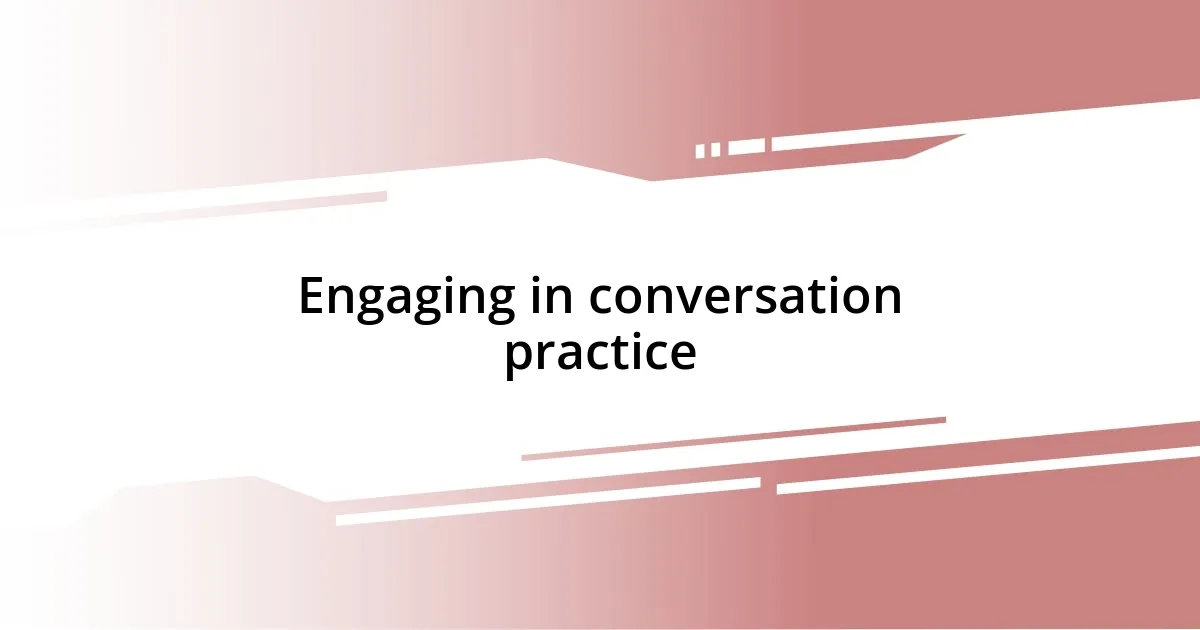
Engaging in conversation practice
Engaging in conversation practice has been crucial for my vocabulary challenges. I vividly recall the first time I joined a language exchange group; the room was buzzing with nervous energy. Initially, I hesitated to speak, worried about making mistakes, but when I finally gave it a try, I was surprised by how supportive everyone was. The act of speaking out loud not only pushed me to use new words but helped me become more confident in my abilities. Have you ever felt that rush of adrenaline when you’re about to say something in a different language?
I also found that structuring my conversations around specific themes worked wonders. When I focused on a topic, like travel or food, I could prepare relevant vocabulary in advance. I remember one evening discussing my love for Italian cuisine; I excitedly used phrases like “al dente” and “umami,” which had previously felt foreign. The energy in the room shifted—having specific terms at the ready allowed me to express ideas more clearly and made our discussion richer. Have you noticed how much easier it is to engage when you feel prepared?
Listening actively during these conversations has been just as important as speaking. By paying attention to how others use vocabulary, I’ve picked up on nuances and idiomatic expressions. I can still picture a friend describing a hiking experience, using the phrase “off the beaten path.” That stuck with me and reshaped my understanding of how to convey my own adventures. How often do we realize that learning can happen in moments when we’re not the ones talking?
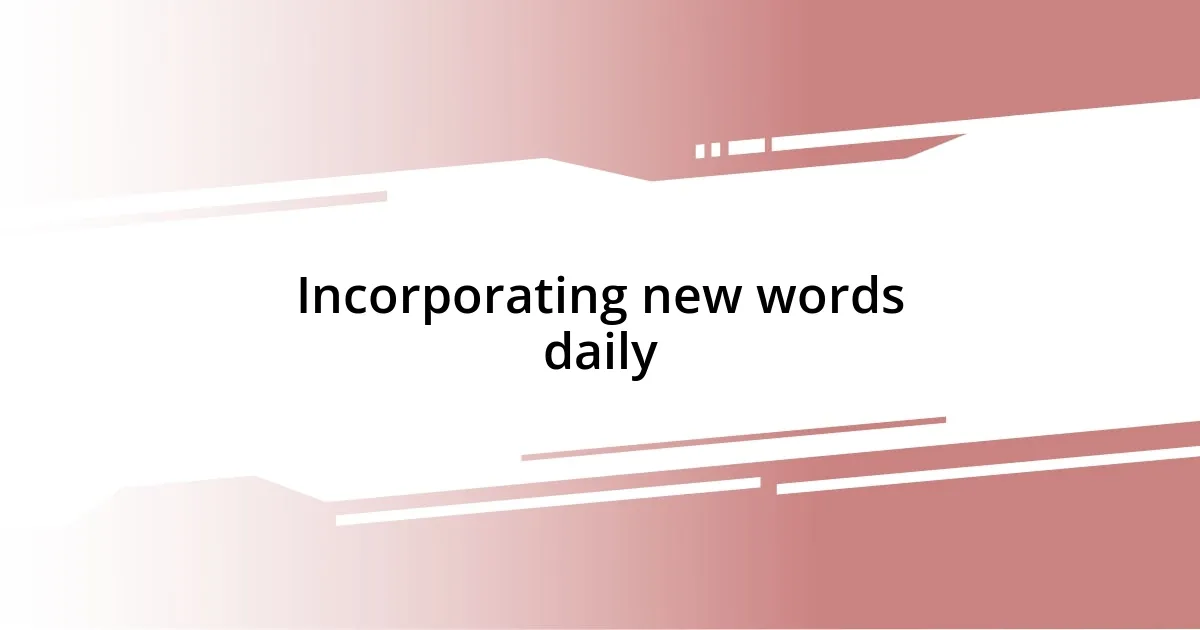
Incorporating new words daily
Incorporating new words into my daily routine has transformed how I communicate. Each evening, I set aside just ten minutes to jot down three words I encountered during the day. This simple habit makes learning feel manageable and fun. I remember one day stumbling upon the word “serendipity” while browsing an article. It resonated with me, reminding me of those delightful moments in life when things unexpectedly turn out beautifully. I not only wrote it down; I made it a point to use it in conversation the next day. Have you noticed how using a word shortly after learning it helps it stick?
Another effective strategy I’ve embraced is pairing new vocabulary with my hobbies. As someone who loves cooking, I began to explore culinary terms in both English and other languages. One evening, while following a recipe, I came across “garnish.” I felt a rush of excitement as I not only learned the word but also got to use it while plating my dish. The sense of accomplishment I felt as I served the meal to friends and confidently described what I had done was exhilarating. Isn’t it amazing how learning can blend seamlessly with our passions?
I also find that reading daily provides a treasure trove of new vocabulary. Sometimes, I highlight unfamiliar words in my book or digital articles. Recently, while engrossed in a novel, I encountered “quintessential.” Rather than glossing over it, I paused to reflect on its meaning and how it applies to the characters. I made a note to incorporate it into my next conversation about the novel. Engaging actively with what I read not only deepens my understanding but makes the process of learning feel more like a dynamic exploration rather than a chore. Have you tried connecting your vocabulary-building efforts with your leisure activities?
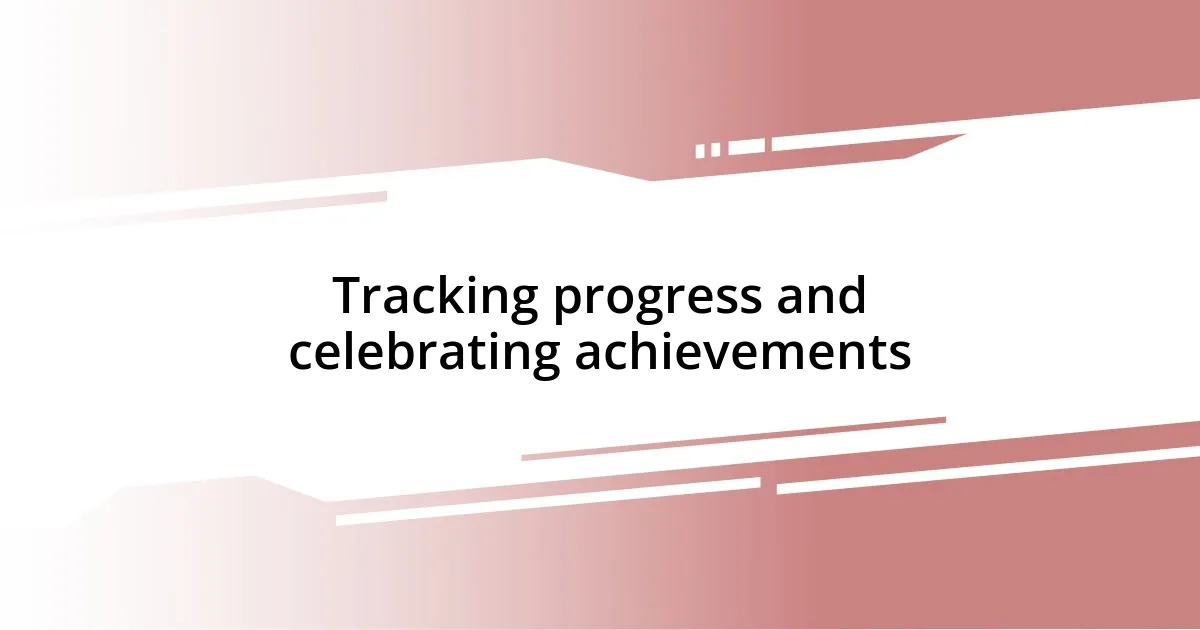
Tracking progress and celebrating achievements
Tracking my progress in vocabulary acquisition has been a game changer for me. I began using a language journal to note down not just new words, but also how I felt using them during conversations. There’s something powerful about reflecting on my emotions and experiences; this practice not only made me aware of my growth but also boosted my motivation. Have you ever taken a moment to appreciate how far you’ve come in mastering a language?
Celebrating achievements, no matter how small, has become a delightful ritual in my learning journey. I’ll treat myself to a favorite snack or indulge in a mini celebration for every ten new words I incorporate seamlessly into my conversations. One time, I remember confidently using the word “meticulous” during a discussion about my weekend gardening project. The sheer joy I felt in expressing my ideas using this new term made me realize that learning is not just about words; it’s about connecting them to our lives and passions. Isn’t the sense of satisfaction incredible when we recognize our own progress?
I also started a visual progress chart, where I could track my vocabulary milestones. Each time I hit a new goal, I’d reward myself with a small token, like a fun sticker. The act of visually seeing my progress made the whole process more tangible and engaging. Just last month, I celebrated reaching my first hundred words with a movie night, where I could practice my new vocabulary by discussing the film with friends afterward. Have you considered how a simple visual representation of your achievements could enhance your learning experience?

